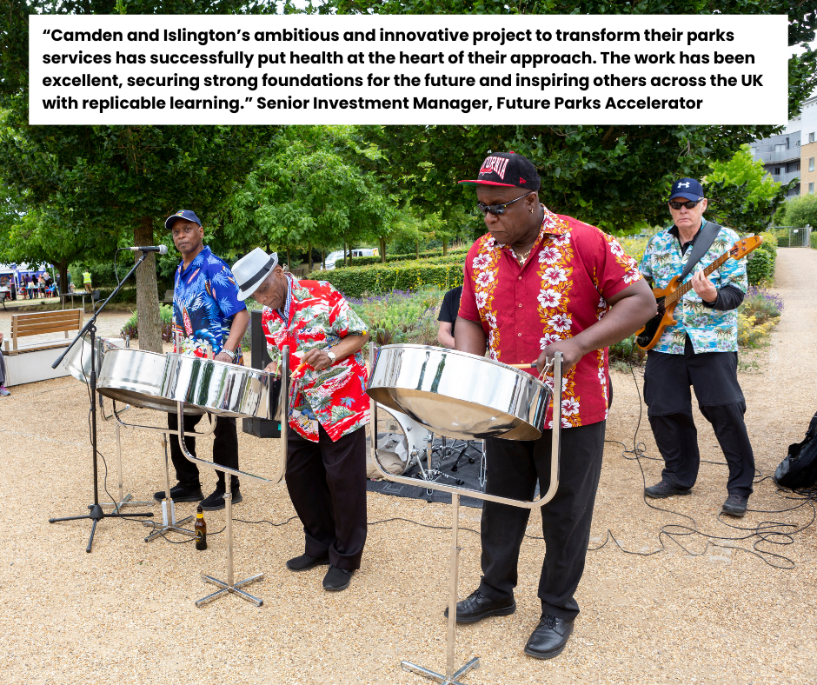Demonstrating public health outcomes achieved, let alone attributing them to specific interventions, can be a challenge. So, it is especially pleasing that Camden and Islington are finalists in this year’s Municipal Journal Awards in the Delivering Better Outcomes category for their work to improve health and reduce health inequalities through access to parks and green spaces. The winners will be announced at the end of June.
The Awards submission, which I wrote on behalf of the team, sets out how a prestigious £0.7 million Future Parks Accelerator (FPA) Grant in 2019 was the catalyst for innovative partnership-working between the two boroughs’ shared public health and respective parks services. This, in turn, has led to: a joint Parks for Health Strategy (PfH); creative collaborations with health and social care including a structured and quality-assured approach to green social prescribing; a transformed working culture, emphasising co-design; and a positive difference made to the lives of more – and more diverse – citizens.
Natural capital accounting methodologies combined with resident voice have underpinned a powerful internal business case for funding improvements despite challenging financial times. Alongside this, the boroughs have successfully bid for additional external grants and leveraged private investment totalling almost £3 million, as well as facilitating community-led bids and initiatives. This includes: the DLUHC Levelling Up Fund (Gospel Oak/Kentish Town); GLA Green and Resilient Spaces (Kilburn), Green and Healthy Streets (Camden Square area and Islington’s Caledonian/Barnsbury wards), Future Neighbourhoods 2030 (Somers Town) and Grow Back Greener (North Camden) funding; plus Business Improvement District and landowner (UCL) partnerships – which address health, equalities and climate change challenges via greenspace development, estates and public realm greening and community investment.
Perhaps most excitingly of all, this approach is now being applied to the wider public realm, with highways, housing and sustainability colleagues all more deeply engaged than ever before. For example, Islington’s housing team is providing £150,000 per annum for a new estates-based community gardening team to increase greening and support volunteering and food-growing for health and wellbeing outcomes. This funding provides dedicated in-house support and read across to biodiversity and climate change initiatives. In North Camden, a local green infrastructure plan was co-produced, facilitating multiple resident-led estates greening projects including a community orchard and allotments. While earlier this year, I facilitated a workshop on behalf of the Central District Alliance which brought together highways, place, sustainability, public health and greenspace colleagues with local business to explore the potential for joined-up working with health and wellbeing at its heart.
In addition to securing local benefits, PfH is providing a model for others, such as green social prescribing in Cambridgeshire, and the teams have been invited to share their learning at numerous events such as Active London, the Health and the Natural Environment APPG, TCPA’S Green Infrastructure Partnership conference and FPA’s Naturally Thriving. It has also facilitated a research pipeline for psychology, environment, industrial design and public engagement students at University College London (UCL) and University of the Arts London (UAL). The Planning Advisory Service is using PfH as a case study.
Partnership with UCL’s Bartlett Faculty of the Built Environment has attracted £50K innovation and knowledge exchange funding for an evidence-based visual framework to help councils and communities plan, manage and assess their green spaces against health and sustainability criteria as well as raise awareness of their benefits with funders and policymakers. The framework was co-developed with practitioners, researchers, Parks for London, the National Trust and Public Health England. We are now testing it further via a network across the five North Central London Integrated Care System boroughs and are in active discussions about future research potential.
The 2023 MJ Awards Delivering Better Outcomes criteria are: improved outcomes for residents; individual and community involvement making a real difference in people’s lives; joined up and cross-sector partnership working achieving more for less; innovation attracting diverse funding and innovative use of resources. Shortlisting Parks for Health, the judges concluded: “Camden and Islington have demonstrated a clear, purposeful, and targeted parks and urban greening strategy which is brimming with innovative ways to utilise parks and green spaces for health outcomes. Demonstrable collaboration, partnering, community involvement, participation, and ownership. A great project that shows some real outside the box thinking with some clear outcomes for the community.” We’re looking forward to the final result!
UPDATE: We were “Highly Commended”. Congratulations to the Mayor’s Violence Reduction Unit for their win!



